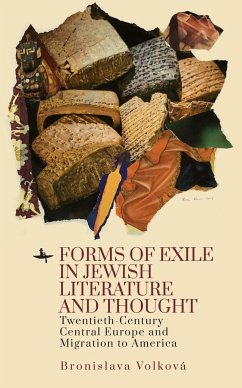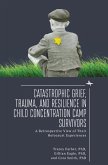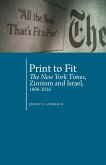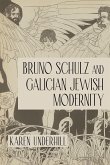Bronislava Volkova
Forms of Exile in Jewish Literature and Thought
Twentieth-Century Central Europe and Migration to America
Bronislava Volkova
Forms of Exile in Jewish Literature and Thought
Twentieth-Century Central Europe and Migration to America
- Gebundenes Buch
- Merkliste
- Auf die Merkliste
- Bewerten Bewerten
- Teilen
- Produkt teilen
- Produkterinnerung
- Produkterinnerung
Deals with the concept of exile on many levels - from the literal to the metaphorical. The book combines analyses of predominantly Jewish authors of Central Europe of the twentieth century who are not usually connected, including Kafka, Kraus, Levi, Lustig, Wiesel, and Frankl.
Andere Kunden interessierten sich auch für
![Can The Whole World Be Wrong? Can The Whole World Be Wrong?]() Richard LandesCan The Whole World Be Wrong?166,99 €
Richard LandesCan The Whole World Be Wrong?166,99 €![Cheerful Memories/Troubled Years Cheerful Memories/Troubled Years]() Aba TaratutaCheerful Memories/Troubled Years20,99 €
Aba TaratutaCheerful Memories/Troubled Years20,99 €![Catastrophic Grief, Trauma, and Resilience in Child Concentration Camp Survivors Catastrophic Grief, Trauma, and Resilience in Child Concentration Camp Survivors]() Tracey Rori FarberCatastrophic Grief, Trauma, and Resilience in Child Concentration Camp Survivors29,99 €
Tracey Rori FarberCatastrophic Grief, Trauma, and Resilience in Child Concentration Camp Survivors29,99 €![Print to Fit Print to Fit]() Jerold S. AuerbachPrint to Fit21,99 €
Jerold S. AuerbachPrint to Fit21,99 €![Bruno Schulz and Galician Jewish Modernity Bruno Schulz and Galician Jewish Modernity]() Karen UnderhillBruno Schulz and Galician Jewish Modernity41,99 €
Karen UnderhillBruno Schulz and Galician Jewish Modernity41,99 €![Israel's Failed Response to the Armenian Genocide Israel's Failed Response to the Armenian Genocide]() Israel W. CharnyIsrael's Failed Response to the Armenian Genocide81,99 €
Israel W. CharnyIsrael's Failed Response to the Armenian Genocide81,99 €![Israel's Failed Response to the Armenian Genocide Israel's Failed Response to the Armenian Genocide]() Israel W. CharnyIsrael's Failed Response to the Armenian Genocide23,99 €
Israel W. CharnyIsrael's Failed Response to the Armenian Genocide23,99 €-
-
-
Deals with the concept of exile on many levels - from the literal to the metaphorical. The book combines analyses of predominantly Jewish authors of Central Europe of the twentieth century who are not usually connected, including Kafka, Kraus, Levi, Lustig, Wiesel, and Frankl.
Hinweis: Dieser Artikel kann nur an eine deutsche Lieferadresse ausgeliefert werden.
Hinweis: Dieser Artikel kann nur an eine deutsche Lieferadresse ausgeliefert werden.
Produktdetails
- Produktdetails
- Verlag: Academic Studies Press
- Seitenzahl: 120
- Erscheinungstermin: 13. Juli 2021
- Englisch
- Abmessung: 234mm x 156mm x 8mm
- Gewicht: 338g
- ISBN-13: 9781644694053
- ISBN-10: 1644694050
- Artikelnr.: 60984113
- Verlag: Academic Studies Press
- Seitenzahl: 120
- Erscheinungstermin: 13. Juli 2021
- Englisch
- Abmessung: 234mm x 156mm x 8mm
- Gewicht: 338g
- ISBN-13: 9781644694053
- ISBN-10: 1644694050
- Artikelnr.: 60984113
Bronislava Volková is a bilingual poet, semiotician, translator, collagist, essayist and Professor Emerita of Indiana University, Bloomington, USA, where she was a Director of the Czech Program at the Slavic Department for thirty years. She is a member of the Czech and American PEN Club. She went into exile in 1974, taught at the Universities of Cologne and Marburg and subsequently at Harvard University and the University of Virginia in Charlottesville. She has published eleven books of existential and metaphysical poetry in Czech and seven bilingual editions illustrated with her own collages. She is also the author of two books on linguistic and literary semiotics, Emotive Signs in Language (John Benjamins, Amsterdam, 1987) and A Feminist's Semiotic Odyssey through Czech Literature (Edwin Mellen Press, N.Y., 1997), as well as the leading co-author of a large anthology of Czech poetry translations Up The Devil's Back: A Bilingual Anthology of 20th Century Czech Poetry (with Clarice Cloutier, Slavica Publishers, 2008). Her scholarly publications include topics of Czech poetry, Czech popular culture, issues of exile, gender, implied author values and emotive signs. Her poetry has been translated into twelve languages and her selected poems appeared in book form in six of them. She has also received a number of literary and cultural awards.
Table of Contents
Acknowledgements
Introduction: A General History of Concepts of Exile
1. Exile as Expulsion and Wandering: Joseph Roth, Sholem Aleichem, Stefan
Zweig
2. Exile as Aesthetic Revolt and an Inward Turn: Hugo von Hofmannsthal,
Robert Musil, Hermann Broch)
3. Exile as Social Renewal: Theodor Herzl, Max Nordau
4. Exile as Resistance and a Moral Stance: Karl Kraus, Arthur Schnitzler
5. Exile as Gender Marginalization and the Independence of the Femme
Fatale: Alma Mahler
6. Exile as an Escape from Patriarchal Oppression: Franz Werfel
7. Exile as Anxiety and Involuntary Memory: Franz Kafka, Sigmund Freud,
Marcel Proust, Bruno Schulz
8. Exile as Doom and Revenge: Hermann Ungar
9. Exile as a Loss of Identity: Saul Friedländer
10. Exile as Abandonment: Peter Weiss
11. Exile as Bearing Witness: Elie Wiesel
12. Exile as Dehumanization: Primo Levi
13. Exile as an Awakening of Consciousness: Ji¿í Weil, Ladislav Fuks,
Arnot Lustig
14. Exile as a Feeling of Meaninglessness: Egon Hostovský
15. Exile as Transformation and a Will to Meaning: Viktor Frankl, Simon
Wiesenthal
Conclusion
Bibliography
Acknowledgements
Introduction: A General History of Concepts of Exile
1. Exile as Expulsion and Wandering: Joseph Roth, Sholem Aleichem, Stefan
Zweig
2. Exile as Aesthetic Revolt and an Inward Turn: Hugo von Hofmannsthal,
Robert Musil, Hermann Broch)
3. Exile as Social Renewal: Theodor Herzl, Max Nordau
4. Exile as Resistance and a Moral Stance: Karl Kraus, Arthur Schnitzler
5. Exile as Gender Marginalization and the Independence of the Femme
Fatale: Alma Mahler
6. Exile as an Escape from Patriarchal Oppression: Franz Werfel
7. Exile as Anxiety and Involuntary Memory: Franz Kafka, Sigmund Freud,
Marcel Proust, Bruno Schulz
8. Exile as Doom and Revenge: Hermann Ungar
9. Exile as a Loss of Identity: Saul Friedländer
10. Exile as Abandonment: Peter Weiss
11. Exile as Bearing Witness: Elie Wiesel
12. Exile as Dehumanization: Primo Levi
13. Exile as an Awakening of Consciousness: Ji¿í Weil, Ladislav Fuks,
Arnot Lustig
14. Exile as a Feeling of Meaninglessness: Egon Hostovský
15. Exile as Transformation and a Will to Meaning: Viktor Frankl, Simon
Wiesenthal
Conclusion
Bibliography
Table of Contents
Acknowledgements
Introduction: A General History of Concepts of Exile
1. Exile as Expulsion and Wandering: Joseph Roth, Sholem Aleichem, Stefan
Zweig
2. Exile as Aesthetic Revolt and an Inward Turn: Hugo von Hofmannsthal,
Robert Musil, Hermann Broch)
3. Exile as Social Renewal: Theodor Herzl, Max Nordau
4. Exile as Resistance and a Moral Stance: Karl Kraus, Arthur Schnitzler
5. Exile as Gender Marginalization and the Independence of the Femme
Fatale: Alma Mahler
6. Exile as an Escape from Patriarchal Oppression: Franz Werfel
7. Exile as Anxiety and Involuntary Memory: Franz Kafka, Sigmund Freud,
Marcel Proust, Bruno Schulz
8. Exile as Doom and Revenge: Hermann Ungar
9. Exile as a Loss of Identity: Saul Friedländer
10. Exile as Abandonment: Peter Weiss
11. Exile as Bearing Witness: Elie Wiesel
12. Exile as Dehumanization: Primo Levi
13. Exile as an Awakening of Consciousness: Ji¿í Weil, Ladislav Fuks,
Arnot Lustig
14. Exile as a Feeling of Meaninglessness: Egon Hostovský
15. Exile as Transformation and a Will to Meaning: Viktor Frankl, Simon
Wiesenthal
Conclusion
Bibliography
Acknowledgements
Introduction: A General History of Concepts of Exile
1. Exile as Expulsion and Wandering: Joseph Roth, Sholem Aleichem, Stefan
Zweig
2. Exile as Aesthetic Revolt and an Inward Turn: Hugo von Hofmannsthal,
Robert Musil, Hermann Broch)
3. Exile as Social Renewal: Theodor Herzl, Max Nordau
4. Exile as Resistance and a Moral Stance: Karl Kraus, Arthur Schnitzler
5. Exile as Gender Marginalization and the Independence of the Femme
Fatale: Alma Mahler
6. Exile as an Escape from Patriarchal Oppression: Franz Werfel
7. Exile as Anxiety and Involuntary Memory: Franz Kafka, Sigmund Freud,
Marcel Proust, Bruno Schulz
8. Exile as Doom and Revenge: Hermann Ungar
9. Exile as a Loss of Identity: Saul Friedländer
10. Exile as Abandonment: Peter Weiss
11. Exile as Bearing Witness: Elie Wiesel
12. Exile as Dehumanization: Primo Levi
13. Exile as an Awakening of Consciousness: Ji¿í Weil, Ladislav Fuks,
Arnot Lustig
14. Exile as a Feeling of Meaninglessness: Egon Hostovský
15. Exile as Transformation and a Will to Meaning: Viktor Frankl, Simon
Wiesenthal
Conclusion
Bibliography







